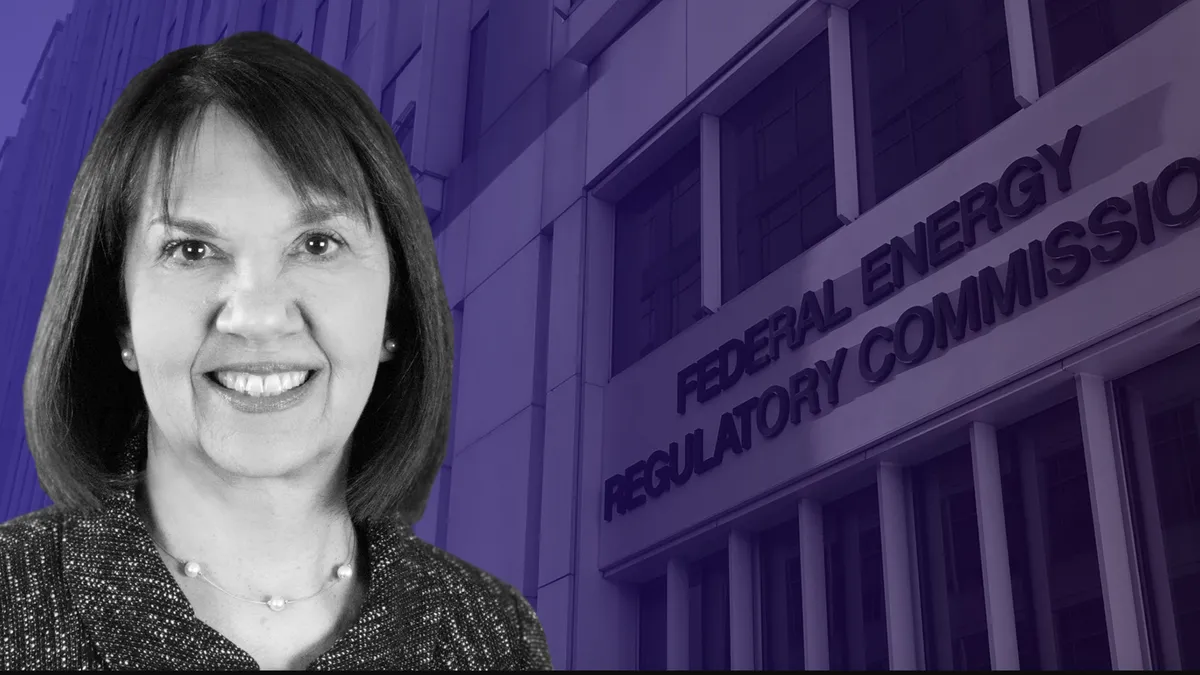Dive Brief:
- Federal Energy Regulatory Commission member Cheryl LaFleur criticized the Department of Energy's proposal to provide cost recovery for coal and nuclear plants on Tuesday, saying that it is likely not detailed enough to form a final rule as written.
- LaFleur also predicted more time will likely be needed beyond the 60-day deadline set by DOE to evaluate the cost recovery proposal, saying that anything outside an outright rejection "would require more work."
- LaFleur, a Democrat, is the second of three sitting FERC members to express serious reservations about the cost recovery proposal. She also weighed in on the Polar Vortex, often used as justification for the DOE plan, saying "there's a tendency to forget" that grid operators have already put reforms in place to ensure power reliability.
Dive Insight:
When Commissioner Robert Powelson declared earlier this month that FERC "will not destroy the marketplace" as it evaluates the DOE proposal, LaFleur retweeted an SNL article on the speech, writing "great sentiment!"
Now the former commission chair has weighed in herself, meaning a majority of the sitting regulators have voiced deep concerns about the DOE proposal.
Multiple lawyers and analysts said when the DOE published its Notice of Proposed Rulemaking (NOPR) that it was too vague to form the basis of a final rule. LaFleur echoed those comments on Tuesday.
"If you were to try to put that [NOPR] into law and make it a FERC tariff it would be considerably more detailed," she told Utility Dive. "We're getting ahead of ourselves because no decision has been made to put that into law, but if you did, it would require quite a lot of articulation of how it would work."
DOE directed FERC to act on the NOPR within 60 days of its filing, but commission Chairman Neil Chatterjee said last week that action could take many forms, including an extension or outright rejection. Unless the commission chooses the latter option, LaFleur expects FERC will need to extend consideration beyond that 60-day timeframe.
"If you said anything other than 'no' then it would require more work," she said. "Anything other than 'let's end the discussion entirely' would require more work, because if you look at how we operate, we usually take comment on things and think things through."
Some energy lawyers have speculated that FERC set its ambitious input timeframe — initial comments are due Oct. 23 — so that it could quickly alter or supercede the NOPR's provisions and reduce regulatory uncertainty from the proposal. LaFleur sidestepped that notion, saying the comment timeframe is simply to meet the DOE directive.
"I think we set the timeframe because we took seriously the 60 days and wanted to be in a position to meet the 60-day deadline in Secretary Perry's directive," she said. "But I agree with what I've heard Chairman Chatterjee say in that if there were more steps to happen they would require more process."
LaFleur also echoed comments from Commissioner Powelson this week on the Polar Vortex. While Secretary of Energy Rick Perry often mentions the threat of emergencies like the Vortex as justification for the NOPR, Powelson called the notion that gas performance issues drove outages during that episode a "mistruth."
LaFleur said outage issues during the Vortex "weren't all gas related," and pointed out that PJM and ISO-New England put in place capacity performance reforms in the aftermath of the cold snap to ensure generators would be available to meet demand.
"Two of the major markets have made significant market redesigns in response to the Polar Vortex intended to make sure they had enough power at times of greatest system stress — seen as a part of resilience," she said. "So I think when you think about the Polar Vortex sometimes there's a tendency to forget that things have already happened in response."
New research from the Environmental Defense Fund suggests that some of the gas generator issues during the Vortex may have been influenced by artificial withholding of pipeline capacity by two New England utilities — now the subject of a regulatory investigation in Connecticut.
LaFleur said she was aware of the issues, but like Chatterjee last week declined to comment on the report.
"It's something I've known about, but I don't want to talk about the merits," she said.














